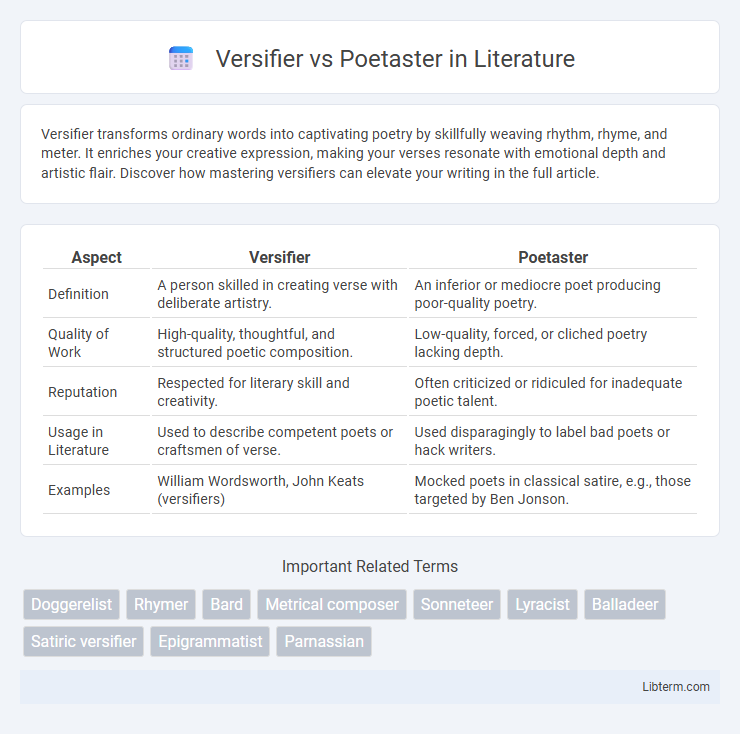Versifier transforms ordinary words into captivating poetry by skillfully weaving rhythm, rhyme, and meter. It enriches your creative expression, making your verses resonate with emotional depth and artistic flair. Discover how mastering versifiers can elevate your writing in the full article.
Table of Comparison
| Aspect | Versifier | Poetaster |
|---|---|---|
| Definition | A person skilled in creating verse with deliberate artistry. | An inferior or mediocre poet producing poor-quality poetry. |
| Quality of Work | High-quality, thoughtful, and structured poetic composition. | Low-quality, forced, or cliched poetry lacking depth. |
| Reputation | Respected for literary skill and creativity. | Often criticized or ridiculed for inadequate poetic talent. |
| Usage in Literature | Used to describe competent poets or craftsmen of verse. | Used disparagingly to label bad poets or hack writers. |
| Examples | William Wordsworth, John Keats (versifiers) | Mocked poets in classical satire, e.g., those targeted by Ben Jonson. |
Understanding the Terms: Versifier and Poetaster
A versifier is an individual skilled in composing verses, often demonstrating rhythmic and metrical proficiency in poetry. A poetaster, by contrast, refers to an inferior poet whose work is considered mediocre or lacking artistic quality. Understanding these distinctions highlights the varying levels of poetic craftsmanship and critical reception in literary analysis.
Historical Origins and Etymology
Versifier originates from the Latin word "versificator," meaning one who composes verses, historically tied to the structured craft of poetry in classical Rome. Poetaster combines "poet" with the suffix "-aster," derived from Latin, implying a substandard or inferior poet, a term coined during the Renaissance to criticize mediocre verse makers. These etymological roots reflect a distinction grounded in quality and expertise within poetic tradition.
Defining Characteristics of a Versifier
A versifier is defined by their technical ability to compose verses with strict adherence to metrical patterns and rhyme schemes, often prioritizing form over profound thematic content. Their work tends to exhibit mechanical precision and formulaic structure, lacking the emotional depth or creative innovation typically found in poetic masters. Unlike a poetaster, whose verses are notably poor or crude, a versifier produces competent but uninspired poetry emphasizing craft rather than artistic excellence.
What Makes a Poetaster?
A poetaster is characterized by producing verse lacking in artistic quality, often marked by forced rhymes and shallow imagery that fail to evoke genuine emotion or insight. Unlike accomplished versifiers who skillfully manipulate meter, rhythm, and metaphor, poetasters typically display poor command of poetic techniques and a superficial understanding of language's expressive potential. This deficiency results in works that are unintentionally humorous, overly simplistic, or derivative, undermining the essence of lyrical craftsmanship.
Versifier vs Poet: Key Differences
Versifier refers to a person who writes verses with technical skill but often lacks depth or originality, whereas a poet demonstrates creativity, emotional expression, and mastery of language. The key difference lies in artistry; poets craft meaningful, impactful works while versifiers may rely on formulaic or mechanical composition. Versifiers are sometimes viewed as less authentic compared to poets who evoke profound experiences through their poetry.
The Artistry Factor: Quality vs Quantity
Versifier often emphasizes quantity, producing numerous verses with basic structure but limited depth or originality, focusing on volume rather than artistic excellence. Poetaster, by contrast, aims for higher craftsmanship, prioritizing quality through intricate language, emotional resonance, and refined poetic devices that elevate the work's artistic value. The artistry factor distinguishes versifiers as prolific yet superficial, while poetasters strive for enduring literary merit despite sometimes inconsistent output.
Cultural Perceptions and Criticisms
Versifiers are often viewed as skilled craftsmen of verse, valued for their technical ability and contribution to literary traditions, while poetasters are criticized for producing inferior, cliched poetry lacking originality and depth. Cultural perceptions tend to elevate versifiers as respectable artists who uphold poetic standards, whereas poetasters are frequently dismissed as amateurs whose work undermines the art form. Criticisms of poetasters highlight their reliance on formulaic expressions and absence of emotional resonance, contrasting with versifiers' recognized proficiency and artistic integrity.
Famous Versifiers and Notorious Poetasters
Famous versifiers like William Shakespeare and Alexander Pope are celebrated for their skillful manipulation of meter and rhyme, producing enduring poetic works admired for their technical prowess and emotional depth. Notorious poetasters, such as William McGonagall, often face criticism for clumsy rhyme schemes and awkward meter that undermine the intended artistic impact. The distinction between versifier and poetaster hinges on mastery of poetic form and the ability to evoke resonance through language.
How to Distinguish Original Poetry from Doggerel
Original poetry demonstrates thoughtful structure, meaningful themes, and refined language that evokes emotion and insight, distinguishing it from doggerel's often irregular meter, simplistic rhymes, and trivial content. A versifier typically crafts verses with technical skill and aesthetic purpose, while a poetaster produces doggerel characterized by careless composition and lack of depth. Evaluating rhyme scheme consistency, tonal coherence, and thematic originality can help identify genuine poetic artistry versus mere doggerel.
The Modern Relevance of Versifiers and Poetasters
Versifiers and poetasters hold distinct places in modern literary culture, with versifiers often celebrated for their technical skill and adherence to form, while poetasters typically face criticism for superficial or amateurish poetry. In contemporary digital platforms and social media, the accessibility of poetry creation has blurred these distinctions, allowing a wider audience to engage in poetic expression regardless of expertise. This democratization underscores the evolving relevance of both versifiers and poetasters, highlighting the diverse spectrum of poetic voices in today's literary landscape.
Versifier Infographic

 libterm.com
libterm.com